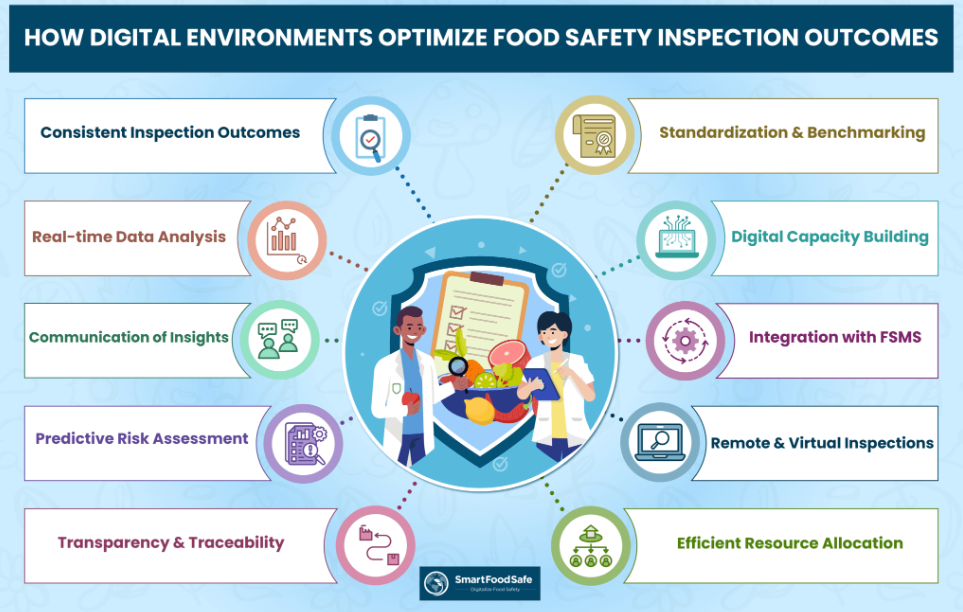
Competent authorities (CAs) in the European Union (EU) countries participated in a revolutionary study exploring the level of application of digital technologies in official food safety control inspections, revealing a remarkable 62.5% of the surveyed respondents reporting that they have already incorporated digital environments to some extent during their food safety inspections.
The assessment involved administering a questionnaire to CAs from 15 EU countries, with a total of 88 national, regional, or local CAs participating in the survey. It brought to light that further possibilities exist for the EU food sector to employ digital technologies as support tools for boosting inspection efficiency and identifying the main barriers that stand in the way of achieving an advanced inspection system.
Digital systems present unprecedented opportunities to modernize official food safety control by offering the advantage of recording and reporting data directly in digital format and enabling process automation through rule-based instructions to simplify the analysis and disclosure of inspection data. Let us have an elaborate look into the study to understand the contemporary approaches for optimized inspection outcomes and how transitioning from paper-based to digital systems positively impacts the consistency of official control measures.
The purpose of the research project funded by the Barcelona Public Health Agency was to investigate the benefits and barriers, and bridge the knowledge gaps associated with adopting digital environments in retail food safety inspections, leveraging vital insights for EU stakeholders.
Following the experience of developing and implementing a digital environment for inspections in Barcelona, Spain, the Barcelona Public Health Agency distributed an initial questionnaire to CAs to gather information. The survey took place online between April and May 2022 and was dispensed to CAs in all 27 EU Member States through the Heads of Food Safety Agencies group.
The significant shift of 62.5% towards integrating digital inspection strategies is driven by key internal and external motivations, which include:
Internal Reasons:
Standardization of documentation procedures for inspection data (80%)
Ensuring accessibility of all data for inspection preparation (69.1%)
Avoiding duplicate work for officers during inspections (54.5%)
External Reasons:
The need to modernize public administration technologically (54.5%)
Responding to food business operators’ desire for access to inspection data and results (52.7%)
Of the 37.5% of CAs who reported not using a digital environment during inspections, 39.4% equally and totally agreed that the lack of budget and technological constraints were the reasons. Additionally, 33.3% cited a shortage of information technology personnel. Some authorities provided open-ended comments, expressing concerns about the coexistence of different and non-interoperable digital systems in public administration and the lack of Internet connection at food premises.
Major Observations:
Those who used a digital inspection environment experienced benefits such as improved communication and data exchange with food business operators, reduced paper usage, data standardization, and modernized public administration.
Among the food safety inspection processes conducted through a digital environment, having access to reports of past inspections was the most common, followed by the automatic generation of digital inspection reports based on templates.
Post-inspection processes through a digital environment included storing reports in digital format and reporting annual official control and sampling data to national authorities, the European Commission, and the European Food Safety Authority (EFSA).
The formation and enforcement of digital inspection environments were primarily facilitated by internal personnel, although external personnel were involved in about two-thirds of instances.
The involvement of management in the development process was moderate, while officers showed high engagement, involvement, and motivation.
Training workshops and educational materials were the most common activities used to prepare officers for digital inspection environments.
A digital environment in food safety inspection is seen as the context where digital tools and devices are used to record, analyze, transmit data, or enable communication and collaboration between food business owners and other stakeholders along the food chain.
Digital tools enable real-time data collection and analysis during inspections, swiftly identifying potential safety risks for prompt decision-making. This agility prevents issue escalation and supports efficient risk management. Continuous learning for inspectors thrives through digital platforms, fostering informed expertise and standardizing practices.
Digitization eliminates errors found in paper-based processes, ensuring precise data collection and enhancing reliability. Remote sensors and cameras facilitate remote inspections, especially in hazardous environments, saving time and resources while maintaining thoroughness. Technology-driven analytics predict and address food safety risks before they escalate, enhancing proactive prevention.
Efficient allocation of inspection resources is achieved via digital systems, targeting high-risk areas and maximizing limited resources. Integration with food safety management systems streamlines data sharing and comprehensive approaches to management. Transparency is promoted through digital tools, enabling inspection result sharing among authorities, businesses, and consumers, fostering trust and accountability.
Digital systems enable traceability, allowing consumers to access food safety inspection data from origin to consumption, raising awareness, and encouraging businesses to uphold safety standards. In essence, digital transformation enhances inspection efficiency, decision-making, learning, transparency, and proactive risk management in the food safety domain.
Smart Food Safe is committed to leading the way in guiding food industries toward creating a robust digital environment that enhances the efficiency of food safety inspections. Our tech-enabled and cost-effective software modules are thoughtfully designed to ensure quality, food safety, and regulatory compliance in the food industry. By digitizing risk-based hazard analysis, preventive control planning, root cause analysis, CAPA, audit and recall management, and environmental monitoring, we enable businesses to oversee their inspection activities skillfully.
Our innovative functionalities aid in data analysis, identifying high-risk areas, and pinpointing sources of contamination, empowering inspectors and authorities to allocate resources with competence. With the shift from traditional paper-based methodologies to digital systems on smartphones, tablets, or other mobile devices, Smart Food Safe encourages embracing the digital age of food safety inspections, advocating a safer and more productive food supply chain.
_1.png)